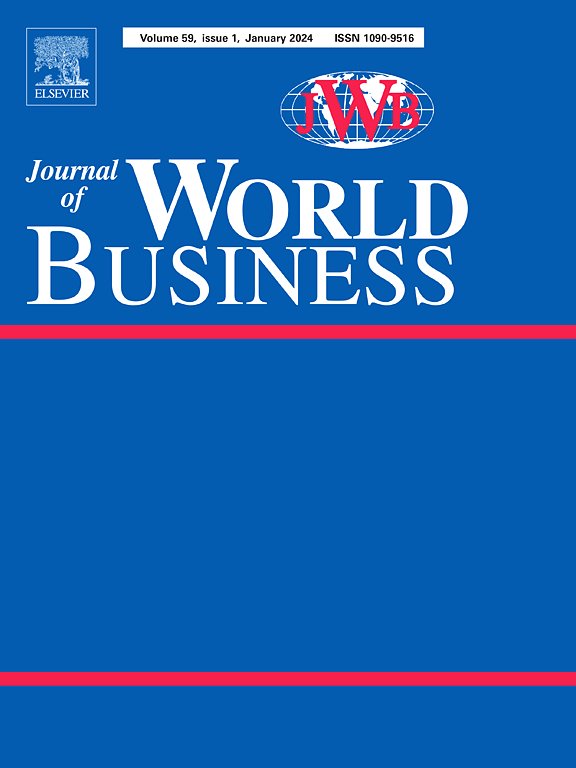跨国公司的政治嵌入与收购后创新:体验式学习的作用
IF 8.8
1区 管理学
Q1 BUSINESS
引用次数: 0
摘要
政治嵌入性已被证明会影响企业的创新和国际化。然而,其对跨国收购后收购方创新绩效的影响仍未得到充分探讨。基于资源依赖理论和经验学习视角,本研究探讨了政治嵌入性对跨国并购后创新绩效的影响,并考察了企业层面经验学习的调节作用。我们进一步认为,当高层管理团队成员拥有更大的国际经验和认知多样性时,这种调节效应会得到加强。利用2010 - 2020年中国跨国并购数据,我们的研究结果证实了政治嵌入性对并购后创新绩效的负面影响,但企业层面和tmt层面的体验学习共同缓解了这一影响。本研究通过强调体验式学习作为一种机制的复杂性,为文献做出了贡献,通过这种机制,具有政治背景的企业可以提高其在跨境收购中的创新。本文章由计算机程序翻译,如有差异,请以英文原文为准。
Political embeddedness and post-acquisition innovation in MNEs: The role of experiential learning
Political embeddedness has been shown to influence firms’ innovation and internationalization. However, its impact on acquirers’ innovation performance following cross-border acquisitions remains underexplored. Drawing on the resource dependence theory (RDT) and the experiential learning perspective, this study investigates how political embeddedness affects innovation performance after cross-border acquisitions and examines the moderating role of firm-level experiential learning. We further argue that this moderating effect is strengthened when top management team (TMT) members possess greater international experience and cognitive diversity. Using a dataset of Chinese cross-border acquisitions between 2010 and 2020, our findings confirm that political embeddedness negatively affects post-acquisition innovation performance, but that firm- and TMT-level experiential learning jointly mitigate this effect. This study contributes to the literature by highlighting the complex nature of experiential learning as a mechanism through which politically embedded firms can improve their innovation in cross-border acquisitions.
求助全文
通过发布文献求助,成功后即可免费获取论文全文。
去求助
来源期刊

Journal of World Business
BUSINESS-
CiteScore
16.50
自引率
11.20%
发文量
73
期刊介绍:
The Journal of World Business holds a distinguished position as a leading publication within the realm of International Business. Rooted in a legacy dating back to 1965, when it was established as the Columbia Journal of World Business, JWB is committed to disseminating cutting-edge research that reflects significant advancements in the field. The journal actively seeks submissions that propel new theoretical frameworks and innovative perspectives on International Business phenomena. Aligned with its domain statement, submissions are expected to possess a clear multinational, cross-border, or international comparative focus, while remaining pertinent to the study of management and organizations. JWB particularly encourages submissions that challenge established theories or assumptions, presenting pioneering or counterintuitive findings. With an inclusive approach, the journal welcomes contributions from diverse conceptual and theoretical traditions, encompassing allied social sciences and behavioral sciences. Submissions should either develop new theories or rigorously test existing ones, employing a variety of qualitative, quantitative, or other methodological approaches. While JWB primarily caters to scholars and researchers, it values contributions that explore implications for Multinational Enterprises and their management, as well as ramifications for public policy and the broader societal role of business.
 求助内容:
求助内容: 应助结果提醒方式:
应助结果提醒方式:


